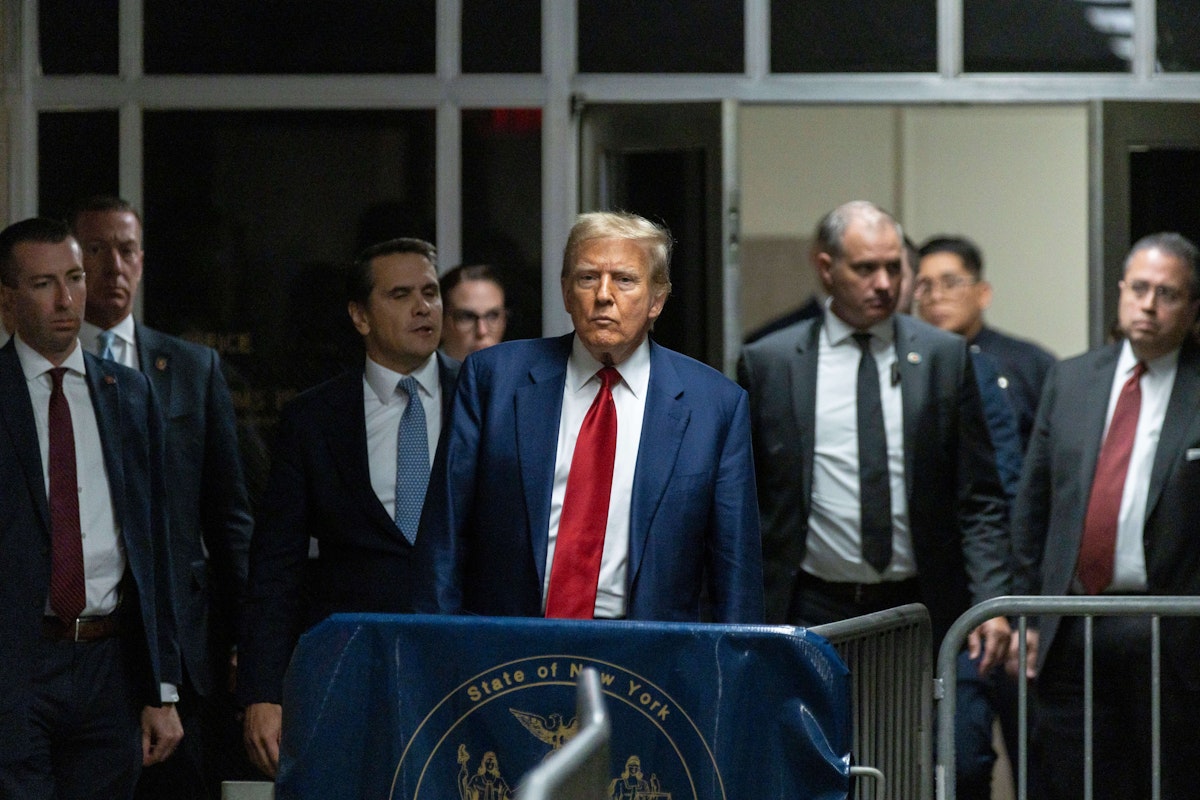We May Finally Get to Write: “Convicted Felon Donald Trump”
We’re finally here. This week, Donald Trump will sit in a courtroom and face criminal charges. The courtroom has not been kind to Trump this year: A Manhattan jury found the Trump Organization guilty on 17 counts of tax fraud last December, and E. Jean Carroll won that hefty judgment against Trump for sexual abuse, but these were civil proceedings. So mark this down as the week the criminal justice system finally managed to haul Trump before the bar of justice.The only real question here is why this took so long. It’s not as if it wasn’t obvious in 2015 that Trump had total contempt for the law. That was easy for all to see. How has he gotten away with it for this long? It’s partly due to an utterly docile Republican Party, whose leaders know very well that Trump’s a brigand but are afraid to say so. It’s partly Trump’s reliance on an old Roy Cohn legal strategy—delay, deny, accuse the other side of what you yourself have done, conjure up totally fictional defenses that should be laughed out of court but at least slow down the proceedings. And conservative judges have played their role, such as Aileen Cannon and the U.S. Supreme Court.But crucially, this is also a media story—more precisely, it’s the story of our two medias, the mainstream and the right-wing. The mainstream media have consistently held Trump to a lower standard of behavior than other politicians, and the right-wing media have held him to no standard of behavior, making excuses for everything. It’s so important to understand this phenomenon. We have two medias in this country. One wakes up every morning looking for a fight, and the other, with some exceptions, wakes up every morning looking for nuance and rationalizations. It’s a huge part of the story of how we got here.Take this now completely forgotten tale from the very early days of the Trump administration. On January 24—Trump’s fourth day in office—then–national security adviser Mike Flynn was interviewed by the FBI about his Russia connections. On January 26 and 27, Sally Yates of the Justice Department told the White House about her department’s suspicions about Flynn. That same night of January 27—the first week of his presidency—Trump had dinner with then–FBI director James Comey. The FBI was investigating Flynn. It was also, we learned shortly thereafter, investigating Trump’s 2016 campaign.What was said at that dinner? We don’t know everything, but that May, Trump admitted that he asked Comey if he, Trump, was under investigation. The mere asking of the question, as Lawrence Tribe said at the time, was a high crime and misdemeanor—an attempt to intimidate and to obstruct justice.That should have launched a congressional investigation at the very least. But the Republicans controlled the House at the time, so that wasn’t going to happen. In fact, then-Speaker Paul Ryan came out and called Comey compromised, backing Trump all the way.And the media? Oh, it was a story all right, I wouldn’t deny that it was. But while I haven’t done a content analysis, I’d bet you that Bill Clinton’s tarmac visit with Loretta Lynch inspired more outrage in both medias than this episode did. Naturally, I’m not defending what Clinton did. But he was an ex-president with no power over Lynch. Trump was the sitting president will all power over Comey—which he exercised that May by firing him.This is one of dozens of examples in which Trump flagrantly violated norms and standards. It made a little stink for a moment or two, but it eventually faded away, quietly departing the front pages, blending into the blurry background of half-remembered Trumpian lies and outrages that have proven to be too numerous for the media watchdogs to actually keep track of, leaving one feeling overwhelmed.That’s why this week is different. This, finally, is a court of criminal law. There will be facts submitted for the record. There will be testimony, under oath. And eventually, in an estimated six weeks or so, there will be a verdict from a jury of Trump’s peers. That verdict might exonerate Trump. But most experts don’t think it will. It seems pretty obvious that Trump ordered Michael Cohen to make that payment to Stormy Daniels for the reason the prosecution alleges—to keep the affair from becoming public before the election. So, with any luck, by Memorial Day or so, we’ll be able to write the phrase that has been crying to be written for about 35 years: “Convicted felon Donald Trump.”How much will that change things, if it comes to pass? Maybe not much, immediately. The pro-Trump media will say he was railroaded, and the mainstream media will move on to the next story. Not many Americans have served on juries—about one in 10 in the last decade, according to this survey. But faith in the jury system is high. That may well be especially so in a case like this one, which until this week has been, to your disinterested observer, a partisan circus. But a jury’s verdict has an authority and finality for these Americans that a S

We’re finally here. This week, Donald Trump will sit in a courtroom and face criminal charges. The courtroom has not been kind to Trump this year: A Manhattan jury found the Trump Organization guilty on 17 counts of tax fraud last December, and E. Jean Carroll won that hefty judgment against Trump for sexual abuse, but these were civil proceedings. So mark this down as the week the criminal justice system finally managed to haul Trump before the bar of justice.
The only real question here is why this took so long. It’s not as if it wasn’t obvious in 2015 that Trump had total contempt for the law. That was easy for all to see. How has he gotten away with it for this long?
It’s partly due to an utterly docile Republican Party, whose leaders know very well that Trump’s a brigand but are afraid to say so. It’s partly Trump’s reliance on an old Roy Cohn legal strategy—delay, deny, accuse the other side of what you yourself have done, conjure up totally fictional defenses that should be laughed out of court but at least slow down the proceedings. And conservative judges have played their role, such as Aileen Cannon and the U.S. Supreme Court.
But crucially, this is also a media story—more precisely, it’s the story of our two medias, the mainstream and the right-wing. The mainstream media have consistently held Trump to a lower standard of behavior than other politicians, and the right-wing media have held him to no standard of behavior, making excuses for everything.
It’s so important to understand this phenomenon. We have two medias in this country. One wakes up every morning looking for a fight, and the other, with some exceptions, wakes up every morning looking for nuance and rationalizations. It’s a huge part of the story of how we got here.
Take this now completely forgotten tale from the very early days of the Trump administration. On January 24—Trump’s fourth day in office—then–national security adviser Mike Flynn was interviewed by the FBI about his Russia connections. On January 26 and 27, Sally Yates of the Justice Department told the White House about her department’s suspicions about Flynn.
That same night of January 27—the first week of his presidency—Trump had dinner with then–FBI director James Comey. The FBI was investigating Flynn. It was also, we learned shortly thereafter, investigating Trump’s 2016 campaign.
What was said at that dinner? We don’t know everything, but that May, Trump admitted that he asked Comey if he, Trump, was under investigation. The mere asking of the question, as Lawrence Tribe said at the time, was a high crime and misdemeanor—an attempt to intimidate and to obstruct justice.
That should have launched a congressional investigation at the very least. But the Republicans controlled the House at the time, so that wasn’t going to happen. In fact, then-Speaker Paul Ryan came out and called Comey compromised, backing Trump all the way.
And the media? Oh, it was a story all right, I wouldn’t deny that it was. But while I haven’t done a content analysis, I’d bet you that Bill Clinton’s tarmac visit with Loretta Lynch inspired more outrage in both medias than this episode did. Naturally, I’m not defending what Clinton did. But he was an ex-president with no power over Lynch. Trump was the sitting president will all power over Comey—which he exercised that May by firing him.
This is one of dozens of examples in which Trump flagrantly violated norms and standards. It made a little stink for a moment or two, but it eventually faded away, quietly departing the front pages, blending into the blurry background of half-remembered Trumpian lies and outrages that have proven to be too numerous for the media watchdogs to actually keep track of, leaving one feeling overwhelmed.
That’s why this week is different. This, finally, is a court of criminal law. There will be facts submitted for the record. There will be testimony, under oath. And eventually, in an estimated six weeks or so, there will be a verdict from a jury of Trump’s peers.
That verdict might exonerate Trump. But most experts don’t think it will. It seems pretty obvious that Trump ordered Michael Cohen to make that payment to Stormy Daniels for the reason the prosecution alleges—to keep the affair from becoming public before the election. So, with any luck, by Memorial Day or so, we’ll be able to write the phrase that has been crying to be written for about 35 years: “Convicted felon Donald Trump.”
How much will that change things, if it comes to pass? Maybe not much, immediately. The pro-Trump media will say he was railroaded, and the mainstream media will move on to the next story. Not many Americans have served on juries—about one in 10 in the last decade, according to this survey. But faith in the jury system is high. That may well be especially so in a case like this one, which until this week has been, to your disinterested observer, a partisan circus. But a jury’s verdict has an authority and finality for these Americans that a Sean Hannity rant or a New York Times editorial lacks.
So perhaps 60 or 65 percent of America will agree, if Trump is convicted, that he paid off Daniels in order to help him win the election. It barely scratches the surface of Trump’s crimes. And it’s shameful that it took eight years to get here. But a jury’s verdict is a lot harder for him to blame on the deep state and the fake news. In the America that Donald Trump hasn’t yet corrupted, a courtroom still has that standing.



